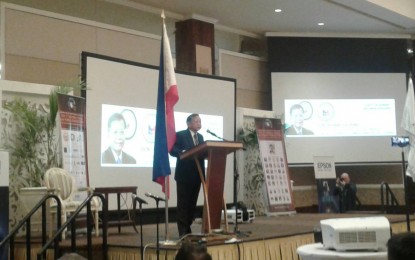
Former Chief Justice and Chairperson of the Consultative Committee Reynato Puno (PNA photo by Azer N. Parrocha)
MANILA -- President Rodrigo R. Duterte will lead a 10-member Transition Commission on Federalism as the country prepares to shift towards a federal form of government.
Former Chief Justice Reynato Puno bared this during the 1st National Forum and Public Consultation dubbed “Revisiting the 1987 Constitution of the Philippines” held at the Manila Hotel on Thursday, where he was invited as a keynote speaker.
Puno said this will be among the transitory provisions in the Federal Constitution currently being finalized by the Consultative Committee (ConCom) to review the 1987 Constitution, which he chairs.
The proposed transitory provisions have been approved at the subcommittee level and will be subject to a final vote when the committee votes en banc on the entire draft Constitution next week, ConCom Senior Technical Assistant and Spokesperson Ding Generoso said.
Puno said the Transition Commission is a body that will “formulate and adopt a transition plan for the orderly shift to the new system of government, as provided for in the new Constitution.”
For proper execution of the transition plan, Puno said it shall promulgate the necessary rules and regulations, orders, decrees, proclamations, and other issues, do all acts to implement a transition plan, and resolve all issues and disputes that may arise.
Moreover, the Transition Commission will also organize, reorganize, and fully establish the federal government and the governments of the federated regions in accordance with the Constitution.
Transition period will take place from 2019 to 2022, Puno said.
Transition Commission members
According to Puno, members of the Transition Commission must possess the following qualifications: natural-born citizen, at least 40 years of age, of proven probity and integrity, and with expertise in the fields of economy, law, fiscal management, governance or development.
There will be a Search Committee, composed of five members, who will search for and vet candidates for members of the Transition Commission, he added.
The Search Committee will be headed by no less than the chairperson of the Civil Service Commission (CSC) while the four members will come from the academe, business, the marginalized sector, and women.
Puno, meanwhile, said that all living Presidents shall be consulted by the Transition Commission, noting that “all of them together will symbolize our unity and harmony” as the shift to a new system takes place.
People’s participation
As for the organization of the new government, especially in the selection of appointees to the new government, the Transition Commission shall ensure the people’s participation by involving faith-based organizations, civil society, indigenous people, sectoral and non-government and other community-based organizations.
“The section will not be based on the ‘tayo-tayo’ (us only) system,” Puno said. It will be based on merit and competence.
Puno also said that the Transitory Commission must complete its work by June 30, 2022.
No term extension for President, Vice
Once the Federal Constitution is in place, Puno reiterated that there will be no term extension for the President and the Vice President.
“We specifically provided that the term of the President and Vice President, which shall end on June 30, 2022, shall not be extended,” Puno said.
On the other hand, senators elected during the mid-term 2019 elections will have to settle with a three-year term instead of the six-year term mandated in the 1987 Constitution.
“All the terms would end by 2022,” Puno said. “(The) ‘87 Constitution would be out by the time this new Constitution would kick in.”
Puno, however, said that he could not say when a plebiscite for the Federal Constitution would take place, noting that there is no certainty it would pass in the Congress.
“We do not really know what will happen. They (Congress) may even reject this proposed Constitution,” Puno said.
The first national, regional, and local elections, under the new Constitution, will be held without postponement on the second Monday of May 2022. (PNA)
